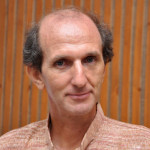
Born in France in 1956, Michel Danino has been living in India since 1977 and is an Indian citizen. A student of Indian civilization, he authored The Lost River: On the Trail of the Sarasvati (Penguin India, 2010), a multidisciplinary study of the Vedic Sarasvati river, and Indian Culture and India’s Future (DK Printworld, 2011). With Prof. Kapil Kapoor he co-edited a two-volume textbook on Knowledge Traditions and Practices of India (2013 & 2015) for a CBSE elective course for class XI and XII. He recently edited Sri Aurobindo and India’s Rebirth (Rupa Books, 2018).
Michel Danino has lectured and taught on aspects of Indian civilization and culture at several institutions. From 2011 to 2017 he was a guest professor at IIT Gandhinagar, where he is currently visiting professor and coordinates the Archaeological Sciences Centre. He is also a member of Indian National Commission for History of Science, Indian National Science Academy.
Abstracts of the lectures
- Non-Indian sources on Indian technologies
Ancient Indian technologies can be documented through archaeological investigations, texts, inscriptions or direct testimonies. This first lecture starts with Mesopotamian evidence on Harappan technologies, then moves on to a selection of Greek, Roman, Chinese and Arab sources, which often concur on those technologies — metallurgy, crafts, textile, etc. — that greatly enriched India through her exports to many regions of the world.
- Travellers’ testimonies on Indian technologies
This lecture proceeds from the preceding one and uses a variety of Italian, French, Arab or British travellers to India, right up to the early colonial period, who left important testimonies on the technologies and procedures they witnessed.
- Metrology: measurements and units in ancient India
From Harappan to colonial times, Indian craftsmen, town-planners, architects, builders, sculptors and administrators have created and used many systems of units for linear measures, surface, volume, weight and time. Within this bewildering variety, which often eluded standardization, several general concepts and principles can be discerned, which this lecture will try to bring to light through a few case studies.